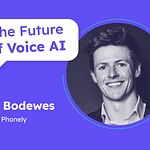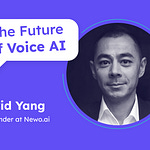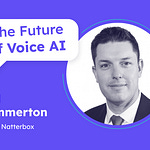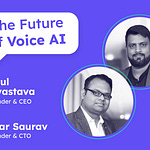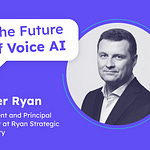In the Future of Voice AI series of interviews, I ask three questions to my guests:
- What problems do you currently see in Enterprise Voice AI?
- How does your company solve these problems?
- What solutions do you envision in the next 5 years?This episode’s guest is Himadri Sarkar, Chief Solutions Officer for US Markets at Teleperformance.
Himadri Sarkar is the Chief Solutions Officer for US Markets at Teleperformance (TP). He is a Lean Six Sigma – Master Black Belt, PMP and an MBA in Finance. He has worked across multiple industry sectors such as financial services, insurance, travel and hospitality, telecommunications, and Healthcare in his 24 year career span. He specializes in healthcare as an industry vertical and has driven transformation projects and solutions across consulting, analytics and technology.
TP is a global digital business services company. Their global scale and local presence allows them to be a force of good in supporting their communities, clients and their customers, and the environment. They deliver the most advanced, digitally-powered business services to help the world’s best brands streamline their businesses in meaningful and sustainable ways.
Recap Video
Takeaways
Teleperformance (TP) is the world's largest BPO, operating in over 80 countries with almost 500K employees.
TP blends human talent with AI to drive operational efficiency while maintaining empathy in customer interactions.
Understanding cultural nuances and local market needs are crucial when deploying global solutions.
Voice AI is already addressing global challenges like accents, language barriers, and cultural differences.
AI and automation are critical for handling the scale and complexity of modern customer interactions, but seamless integrations are key.
Businesses adopting AI must carefully balance automation and human touch.
TP leverages voice bots for outbound calls where response rates are already low to balance human resources, transferring calls to human support once the connection is made.
Combining human empathy with AI-driven efficiency creates better outcomes for both businesses and customers.
Real-time insights from voice data can transform customer service by predicting needs and improving personalization.
Advancements in AI are driving the shift from reactive to proactive customer support.
Voice remains the most natural and efficient communication channel.
Companies should look to integrate AI solutions into existing systems to avoid disruptions and maximize value.
AI is not just a tool for cost reduction but a strategic enabler for creating value and innovation.
CX is a key differentiator for brands, with AI playing a central role in driving it.
Leveraging AI-powered tools allows shifts to new operating models, quicker and more efficiently
AI implementations aren’t ‘one-and-done’ - continuous improvement and experimentation are essential for staying competitive in the AI space.
Ethical considerations in AI deployment, like fairness and transparency, are critical to long-term success.
The future of CX relies on blending advanced technology with emotional intelligence.






